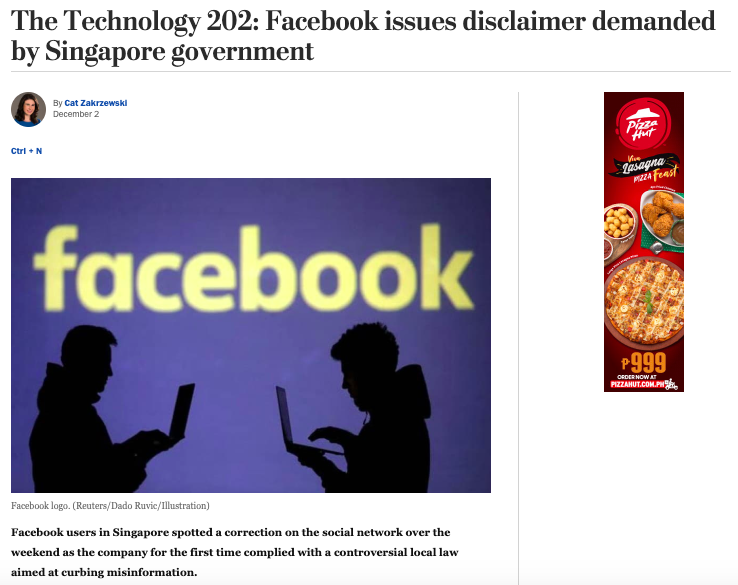Singapore— The Government of Singapore is calling out the Washington Post for “perpetuating false allegations” after the US newspaper only published portions of a letter written by Singapore’s ambassador to the US in response to an online article in The Post concerning Facebook and Singapore’s online falsehood law.
On December 2, the Washington Post published an article by Cat Zakrzewski about how Facebook complied with an order from the Government to print a correction under POFMA (the Protection from Online Falsehoods and Manipulation Act), which said that POFMA may “open the door to broad government censorship” and have a “chilling effect on online free expression,” the latter being a quote from the deputy Asia director of Human Rights Watch’s (HRW), Phil Robertson.
Singapore’s ambassador to the US, Ashok Kumar Mirpuri, wrote a letter refuting these allegations, which the Washington Post did not publish, as they said that the newspaper only publishes letters concerning articles that are included in the newspaper’s print edition.
Mr Mirpuri had written in his letter to The Post, “Censorship entails banning or suppressing offending material. But the Government has not banned or suppressed anything. It has only required Facebook to append to the offending post a link to a factual correction. The original post remains intact. Readers can read it together with the Government’s response, and decide for themselves which tells the truth. This can no more have ‘a chilling effect on online free expression’ than your publishing this letter can stun The Washington Post into silence.”
Ms Zakrzewski, the article’s author, later updated the article to include a portion of the ambassador’s letter, but decided not to print Mr Mirpuri’s letter in full. The author only quoted this part of the Ambassador’s letter: “Singapore – an English speaking, multi-racial, multi-religious society open to the world – is more vulnerable to this threat than most. POFMA seeks to restore balance to the debate, by requiring tech companies to carry clarifications to reach the same target audience as the false statements.”
On Monday evening, the Ministry of Communications and Information (MCI), made public a letter from Bernard Toh, the director of MCI’s information policy division, which was addressed to Fred Ryan, the newspaper’s publisher, as well as to HRW’s Mr Robertson.
Mr Toh wrote that the author “included a brief quote from our letter in her article, but ignored the crux of our response: That contrary to allegations that the Singapore Government had censored a Facebook post that it deemed to be false, the original post remained intact and accessible.
It is ironic that the Post should have responded thus, given that your article had accused us of censorship. By refusing to carry our letter or report it more adequately, the Post is perpetuating false allegations.”
He also said that MCI was making Mr Mirpuri’s letter public “in the interest of transparency,” the Straits Times (ST) reports, as well as to put Government’s refutation on public record.
Additionally, the Government has also written to HRW’s Mr Robertson, who was also quoted in the article in the Washington Post as saying that POFMA was designed “specifically to put Internet companies like Facebook in a headlock to comply with these rights-abusing edicts. With huge, onerous fines and the possibility of even prison time, it’s going to be hard for any company to not comply.”
Mr Toh mentioned that in 2018, HRW was invited to appear before the Parliamentary Select Committee on Deliberate Online Falsehoods and had initially accepted the invitation, but later declined it when the group was told that it would be asked questions concerning a report from December 2017, which said that the Government was suppressing freedom of expression. -/TISG
Read also: Progress Singapore Party responds to Govt’s rebuttal of statement on POFMA
Decision to give PM Lee 2019 World Statesman Award draws mixed reactions

